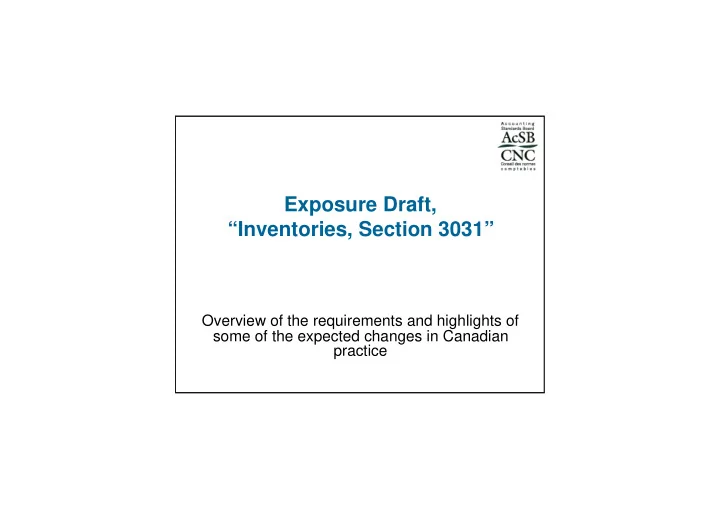

Exposure Draft, Exposure Draft, “Inventories, Section 3031” “Inventories, Section 3031” Overview of the requirements and highlights of Overview of the requirements and highlights of some of the expected changes in Canadian some of the expected changes in Canadian practice practice
Background Significantly enhances Canadian GAAP for inventories Replaces Section 3030, one of the oldest in the Handbook Both IFRS and US GAAP provide more extensive guidance than Section 3030 Based on IAS 2, Inventories 2
Benefits Proposals will significantly improve Canadian GAAP, as they: Require inventory to be valued at lower of cost and net realizable value (with certain exceptions) Provide more extensive guidance on cost Narrow permitted cost formulas Require impairment testing Expand disclosure requirements to increase transparency 3
Applicability Applies to all inventories of all entities, including not-for-profit organizations, except: WIP arising under construction contracts, including directly related service contracts Financial instruments Contributed items and services for which the contribution is not recognized by a not-for- profit organization 4
Measurement Overall, measure inventories at lower of cost and net realizable value, with some exceptions: Certain inventories of not-for-profit organizations excluded Certain inventories excluded from measurement requirements: Agriculture Commodity broker-traders However, other requirements of proposals apply 5
Cost of inventories Costs of purchase Costs of conversion Allocation of overheads Joint products, by-products Other costs Service providers 6
Formulas and techniques to measure cost Specific identification for items not ordinarily interchangeable Formulas: FIFO or weighted average cost — LIFO no longer acceptable Techniques: Standard cost Retail method, as described 7
Impairment Lower of cost and net realizable value, except for certain inventories of not-for-profit organizations Reversal of impairment write-downs Inconsistent with current Canadian GAAP impairment provisions for other assets 8
Disclosures More extensive guidance than Section 3030: Accounting policies used Carrying amounts Amounts recognized as an expense Write-downs Amount of any reversals of write-downs 9
Transition Absence of specific transitional provisions Apply requirements of recently updated Accounting Changes, Section 1506 Apply accounting policy changes retrospectively, except when impracticable Impracticability consideration applies to each accounting policy change Adopting Section 3031 may involve more than one accounting policy change, e.g., overheads, cost formula 10
Not-for-Profit Organizations Specific guidance provided on: Accounting for donated inventory items and services Impairment of inventories held for reasons other than sale 11
Plans for finalizing the proposals Final standard expected Q1 2007 Effective for interim and annual financial statements for fiscal years beginning on or after July 1, 2007 Earlier application encouraged, with disclosure of early application 12
Further information Proposals and supporting materials available at: www.acsbcananda.org Comment deadline — September 15, 2006 13
Recommend
More recommend